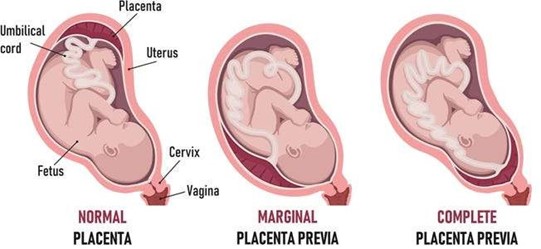A nurse is caring for a client who has a placenta previa. Which of the following findings should the nurse expect?
Nausea.
Polyhydramnios.
Uterine tenderness.
Spotting.
The Correct Answer is D
Placenta previa is a condition where the placenta implants in the lower part of the uterus, partly or completely covering the cervical opening.

This can cause painless, bright red vaginal bleeding, usually in the third trimester. Spotting is a sign of placenta previa and should be reported to the provider immediately. Choice A is wrong because nausea is not a specific finding of placenta previa.
Nausea can occur in normal pregnancy or in other conditions such as hyperemesis gravidarum or preeclampsia.
Choice B is wrong because polyhydramnios is not a finding of placenta previa.
Polyhydramnios is a condition where there is too much amniotic fluid in the uterus, which can cause complications such as preterm labor, cord prolapse, or fetal malformations.
Choice C is wrong because uterine tenderness is not a finding of placenta previa.
Uterine tenderness is a sign of abruptio placentae, which is a condition where the placenta separates from the uterine wall before delivery.
This can cause severe abdominal pain, dark red vaginal bleeding, and fetal distress.
Nursing Test Bank
Naxlex Comprehensive Predictor Exams
Related Questions
Correct Answer is D
Explanation
This is because a cathartic suppository stimulates the nerve endings in the rectum, causing a contraction of the bowel and facilitating defecation. This is especially helpful for clients who have an upper motor neuron or areflexic bowel, which means they have lost the ability to feel when the rectum is full and have a tight anal sphincter muscle. A bowel program is a way of controlling or moving the bowels after a spinal cord injury, which may affect normal bowel function depending on the spinal level involved. A bowel program aims to achieve regular bowel movements, prevent constipation or impaction, and avoid accidents.
Choice A is wrong because encouraging a maximum fluid intake of 1,500 mL per day is not enough to prevent constipation and promote bowel health. A fluid intake of at least 2,000 mL per day is recommended for most adults.
Choice B is wrong because increasing the amount of refined grains in the client’s diet can worsen constipation and reduce stool bulk.
Refined grains are low in fiber, which is essential for normal bowel function. A high-fiber diet of at least 20 to 35 grams per day is advised for clients with spinal cord injuries.
Choice C is wrong because providing the client with a cold drink prior to defecation can have the opposite effect of stimulating the bowel.
Cold drinks can slow down the digestive process and reduce peristalsis, which is the movement of food through the intestines. Warm or hot drinks can help stimulate the bowel and increase peristalsis.
Correct Answer is C
Explanation
Hypertension is a contraindication to living kidney donation because it can increase the risk of kidney disease and cardiovascular complications in the donor. Hypertension can also affect the quality and survival of the donated kidney in the recipient.
Therefore, a potential donor with uncontrolled or poorly controlled hypertension should not undergo a nephrectomy.
Choice A, osteoarthritis, is not a contraindication to living kidney donation.
Osteoarthritis is a degenerative joint disease that does not affect the kidneys or the cardiovascular system.
It may cause pain and stiffness in the joints, but it can be managed with medications and physical therapy. A potential donor with osteoarthritis can donate a kidney if they have normal kidney function and no other medical problems.
Choice B, primary glaucoma, is not a contraindication to living kidney donation.
Primary glaucoma is a condition that causes increased pressure in the eye and can lead to vision loss if untreated.
It does not affect the kidneys or the cardiovascular system. A potential donor with primary glaucoma can donate a kidney if they have normal kidney function and no other medical problems.
Choice D, amputation, is not a contraindication to living kidney donation.
Amputation is the surgical removal of a limb or part of a limb due to injury, infection, or disease.
It does not affect the kidneys or the cardiovascular system. A potential donor with amputation can donate a kidney if they have normal kidney function and no other medical problems.
Normal ranges for blood pressure are less than 120/80 mmHg for systolic and diastolic pressure, respectively.
Normal ranges for kidney function are eGFR above 60 mL/min/1.73 m2 and albuminuria below 30 mg/g.
Whether you are a student looking to ace your exams or a practicing nurse seeking to enhance your expertise , our nursing education contents will empower you with the confidence and competence to make a difference in the lives of patients and become a respected leader in the healthcare field.
Visit Naxlex, invest in your future and unlock endless possibilities with our unparalleled nursing education contents today
Report Wrong Answer on the Current Question
Do you disagree with the answer? If yes, what is your expected answer? Explain.
Kindly be descriptive with the issue you are facing.
